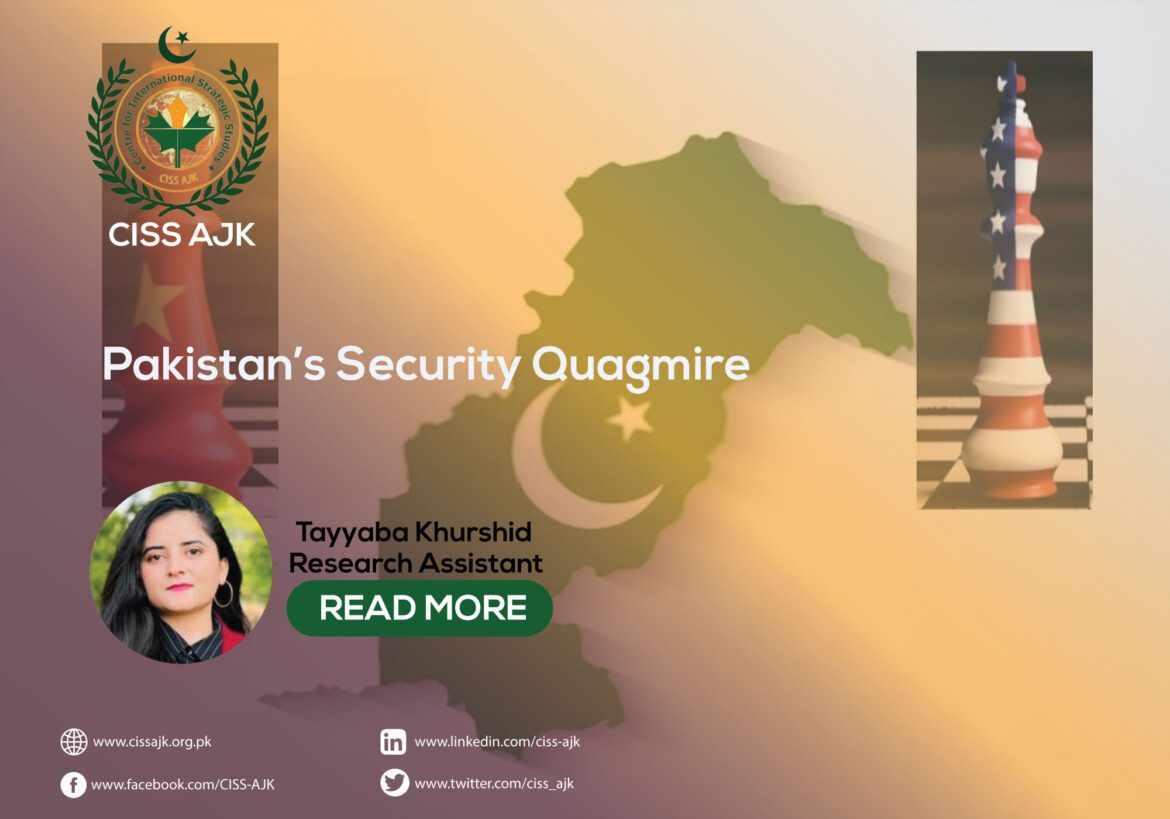874
The national security of Pakistan is in a quagmire and the state is walking on a tightrope trying to pursue its strategic partnership with China and at the same time keeping its relations with the USA on a positive trajectory; while at the same time dealing with internal matters of political instability, economic repression and resurge in terrorism. The geostrategic location of Pakistan makes it a significant player in South Asia, as it is bordering two great powers, China and India. The Global Great Power politics between Washington and Beijing, and ever-evolving strategic nexus between the USA and India pose a challenge to its national security as well as to its vested interests on the regional chessboard.
In a similar vein, the strategic milieu, which is determined by global great power competition between Washington and Beijing, has further made scenario complex, as far as Pakistan’s balancing approach is concerned. Keeping such developments into account, it remains essential that strategic moves of Pakistan be rationally and diplomatically designed with proper calculations. As in December 2021, Pakistan presented its first ever much National Security Policy, which appeared to expand the state’s focus from traditional security issues to non-traditional issues. The policy was comprehensive and holistic, and identified the various security domains that Pakistan would be looking at in the next five years including economic issues, internal challenges, external threats, human security, and environmental concerns along with traditional security issues.
Such a change in the security outlook of the country was curated through a citizen-centric prism. Pakistan’s security policy shifted from the narrow clutches of military security towards human security, but the geostrategic environment demands a balanced approach between both military security and economic security. Careful analysis of four declassified documents of the USA, the National Defense Strategy, Nuclear Posture Review, Nuclear Missile Review and National Security Strategy 2022 highlight the interests of the USA in the Indo-Pacific. In these documents, the USA views China as the only power which has the will and capability to change the International world order according to its interests.
US Defense Secretary Lloyd Austin recently reiterated that “China is a threat to US interest despite Russia’s war and we’ll not let China change the status quo”. According to him, “China is the only competitor out there with both the intent to reshape the international order, and increasingly the power to do so”.
The Chinese Communist Party Meeting CCP 2022 also shows China’s willingness to increase the pace of its modernization of conventional and non-conventional weapons. Moreover, the Foreign Secretary Mao Ning has accused Washington of “Cold War thinking and zero-sum-game sensationalizing geopolitical conflicts and great power competition”. The US China rivalry and the determination of the USA to counter and contain China in the Indo-Pacific through external alliances like QUAD and AUKUS makes the strategic environment vulnerable for Pakistan.
The USA aims to contain China using India as a regional competitor. The resulting military modernization with advanced missiles and weaponry poses a threat to Pakistan as the two states share a history full of disputes, clashes, conflicts and war. Pakistan has been caught in this quagmire where it has to maintain a balance in its strategic partnership with China and at the same time maintain good relations with the USA.
Tilting to one side would be a strategic mistake and hence calculated moves are required without directly involving itself in superpower rivalry and competition. The hegemony of the USA in the International Monetary Fund (IMF) and Pakistan’s dependence on such international financial institutions in its vulnerable economic situation makes it necessary that Pakistan maintains a stable relation with the USA. The USA vows to adopt all means to counter China as the US analysts pledge that they will not let China change the global world order or let China pose a direct threat to US interests. The traditional security landscape demands that Pakistan should maximize its power through military modernization to deter the Indian aggressive designs in the region and maintain strong relationships with great powers. But Pakistan lacks financial resources amidst the economic crisis. Non-traditional issues are also on rise in Pakistan with dwindling economic reserves, political instability, growing polarization, societal unrest, ethnic divide, and food crisis on one hand and resurgence in terrorism, target killing, unresolved conflict, and unrest on Afghan border on the other hand. These internal and external security issues determine the critical political and security landscape of the country. This demands a holistic implementation of the National Security Strategy of 2022 where Pakistan has to focus on both traditional and non-traditional threats along with keeping the internal house in order. Political stability coupled with economic stability and smooth civil-military relations, and effective counter-terrorism strategies, are necessary for internal order. And externally, Pakistan has to stay neutral and pursue its interests with both the USA and China by creating convergences and opportunities for both powers to resolve their matters amicably. Hence, internal stability is very significant for the external geo-strategic environment. Tayyaba KhurshidPolitical stability coupled with economic stability and smooth civil-military relations, and effective counter-terrorism strategies, are necessary for internal order. And externally, Pakistan has to stay neutral and pursue its interests with both the USA and China by creating convergences and opportunities for both powers to resolve their matters amicably. Hence, internal stability is very significant for the external geo-strategic environment.
The writer is a Researcher at the Center For International Strategic Studies, AJK, and can be reached at tayaba.khan127@gmail.com

